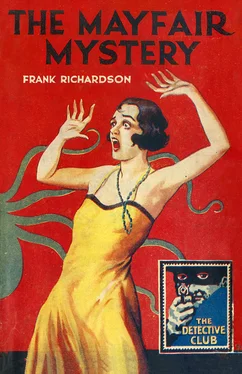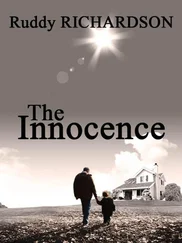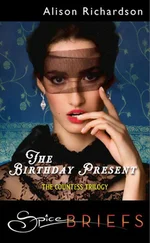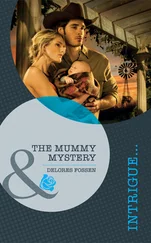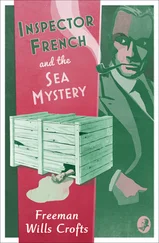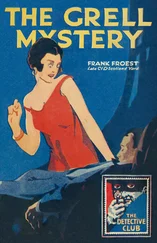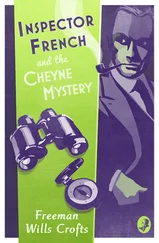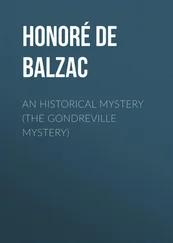Published in the second batch of Detective Story Club titles in November 1929, The Mayfair Mystery was the only one of Frank Richardson’s books acquired by Collins for a reissue. Though none of his others were deemed suitable for the list, its predecessor, The Secret Kingdom (1906), set in the imaginary country of Numania, featured Sherlock Holmes and Dr Watson in one of their earliest parodies, and might have been an interesting contender.
DAVID BRAWN
April 2015
THE body of a man in evening-dress lay on the dull, crimson carpet.
The black eyes were staring fixedly at the electric light hanging from copper shades. The jaw had dropped. The dead man’s face was remarkably handsome. The forehead was broad, and indicative of considerable intellectual power. Strongly-marked black eyebrows jutted perhaps a little too far over the aggressive, aquiline nose. The chin was strong and determined. The close-cut, shiny black hair was silvered at the sides. But for a slight, almost dandified moustache, one would have thought that the features were those of a barrister, of an ideal barrister.
The small room in which the corpse lay had evidently been newly decorated. A smell of varnish was in the air. It was furnished simply and in good taste. The walls were panelled in dark oak, and the few ornaments proved their owner to be a man of excellent judgment in matters of art. A few books, the latest novels, illustrated and scientific papers, lay on a Sheraton table. In the grate burnt a fire of ship’s logs, emitting a fragrant scent that battled with the smell of paint.
In Who’s Who? the dead man’s biography was as follows:
OAKLEIGH, Sir Clifford, First Baronet; created 1903. G.C.B., D.C.L., LL.D., F.R.S. Physician-in-Ordinary to the Princess of Salmon von Gluckstein. Born 21st August 1870. Son of John Oakleigh of Aberdeen and Imogen B. Stapp of Chicago. Education: Eton, Christ Church, Oxford. First-class First Public Examination 1891; First Class Greats 1892; Edinburgh University, Gillespie Prizeman. Recreations: shooting, yachting and hypnotism. Address: 218 Harley Street. Clubs: Athenaeum, United Universities, Garrick, Beefsteak, Gridiron and Arthur’s.
CHAPTER II
CONCERNING THE CORPSE
‘THANK God, I’ve found you!’
As the servant closed the door, Reggie Pardell, in evening-dress, his flabby face pallid, almost ashen, sank into a chair.
George Harding rose hastily.
The K.C. looked down at the frightened figure in the chair, went into the dining-room, and returned with a brandy-and-soda.
‘Drink that,’ he said.
While Reggie drank with long gulps, his eyes stared at the gaunt barrister.
As he scanned the clear-cut, intellectual face, with its piercing grey eyes, its long, sinister, thin nose and tight-shut vigorous mouth, he felt a sensation of returning confidence. At the same time, also, there floated through his mind a feeling of irrelevant despair. Each was thirty-eight years of age. They had been at Christ Church together. George was a brilliant advocate and Reggie was—well, Reggie was an ex-black sheep. A passion for backing losers had been his undoing.
Harding took away the glass.
‘Feel better?’ he asked.
The other nodded.
‘What’s the trouble now?’
It was eleven o’clock, and from the library one could hear the sound of carriages and cabs passing along South Audley Street. In the home there was complete silence.
Reggie shook his head.
‘It’s not a trouble of mine this time, not directly. But it’s the most awful thing that’s ever happened. That’s why I’ve come to see you.’
Harding smiled. His friends always came to him in time of trouble. There was something in the man’s vigorous personality that invited sympathy; his vast reputation for acumen and knowledge of human life rendered him an invaluable adviser in moments of difficulty or danger.
He went back to his chair and lit a cigarette, waiting for his friend to speak.
The first words that came from Reggie’s lips were:
‘Clifford Oakleigh is dead.’
‘Dead!’ cried Harding, aghast at the news that his best friend at Eton and Oxford, and indeed in the world, had died. Horrified, he pressed for particulars.
‘When did he die? How do you know?’
‘I have just come from his house.’
‘From Harley Street?’
‘He doesn’t use that as a house.’
‘I know. He lives at Claridge’s.’ The K.C. corrected himself.
Reggie shook his head.
‘He has lately taken, or rather built, a little house in King Street, Mayfair; just near here. Didn’t he tell you?’
‘Never a word.’
‘Well, he only moved in a week ago.’
‘But what were you doing there? I thought that you and he were not quite…’
‘No,’ said Reggie, grimly. ‘But he has been very good to me one way and another. He has lent me a lot of money; I wouldn’t have gone to him again, but…the fact is I’m his valet.’
The barrister gazed at him in surprise.
‘I was his valet,’ repeated Reggie. ‘He engaged me as a valet.’
‘You were his valet?’
Harding stared at the prematurely fat young man with three pendulous chins and an unbecomingly large waist. It seemed incredible to him that Sir Clifford Oakleigh, one of the most famous physicians of his day, one of the most brilliant men of all time, had selected that mountain of adiposity as his valet. Further, it struck him as extraordinary that a man like Reggie Pardell, a scion of one of the oldest families in England, should be willing to perform these duties.
Reggie explained.
‘You see it was like this, George…Harding. I was absolutely stony. Of course, I’d got clothes, and the run of my teeth, and so on. But I was broke to the world. Poor Clifford met me one day at Arthur’s and he guessed how things were. He made me a sporting offer. He said: “Look here, old chap, you have failed at most things. The only thing you do understand is clothes. Come and be my valet. I will give you £500 a year.” At first, I thought he was joking. But he wasn’t, and he installed me in this little box of his in King Street. Only part of the house is furnished; his sitting-room and bedroom and my bedroom. He never has his meals there. The charwoman comes in every day and sees to the place; all I had to do was to look after his clothes. It really was the most extraordinary arrangement that I’ve ever come across. It was philanthropy on poor old Clifford’s part, because my time was entirely my own.’
The other reflected.
‘It’s strange he never told me about this.’
‘Dear old Clifford wouldn’t,’ rejoined Reggie.
‘You see, he knew that I shouldn’t like it to be known that I was doing a bit of valeting. Well, after all, what’s the disgrace? My elder brother, Horace, is chaperoning the “Venus” at the Nasallheimers’ Gallery in Bond Street. It is his duty to show financiers and peers and people of that sort the beauties of Titian. Of course, if he ever succeeds in selling it, he will lose his job as vestal virgin to the “Venus”. And my cousin, Dartmouth, keeps body and soul and motor together by selling Stereoscopic Co. et Fils Cuvée Anonyme to unwilling aristocrats. Still, Clifford knew that I shouldn’t like people to hear that I was his valet.’
The lawyer’s knowledge of Reggie’s character told him that interruption would be useless. He must tell his story in his own way. He merely showed his impatience by taking out his watch and clicking it.
‘I know,’ said Reggie, accepting the hint.
‘Well, tonight I dined with three pals at White’s. We were going on to the Covent Garden Ball. But, somehow, an extra man turned up and someone suggested Bridge. You know I’ve not got a very good reputation for solvency, and I could see they’d be just as well pleased if I didn’t cut in, so at ten o’clock I left them. I thought at first of going on to the ball alone. But that struck me as being a dull scheme, and so I walked back to King Street.’
Читать дальше
